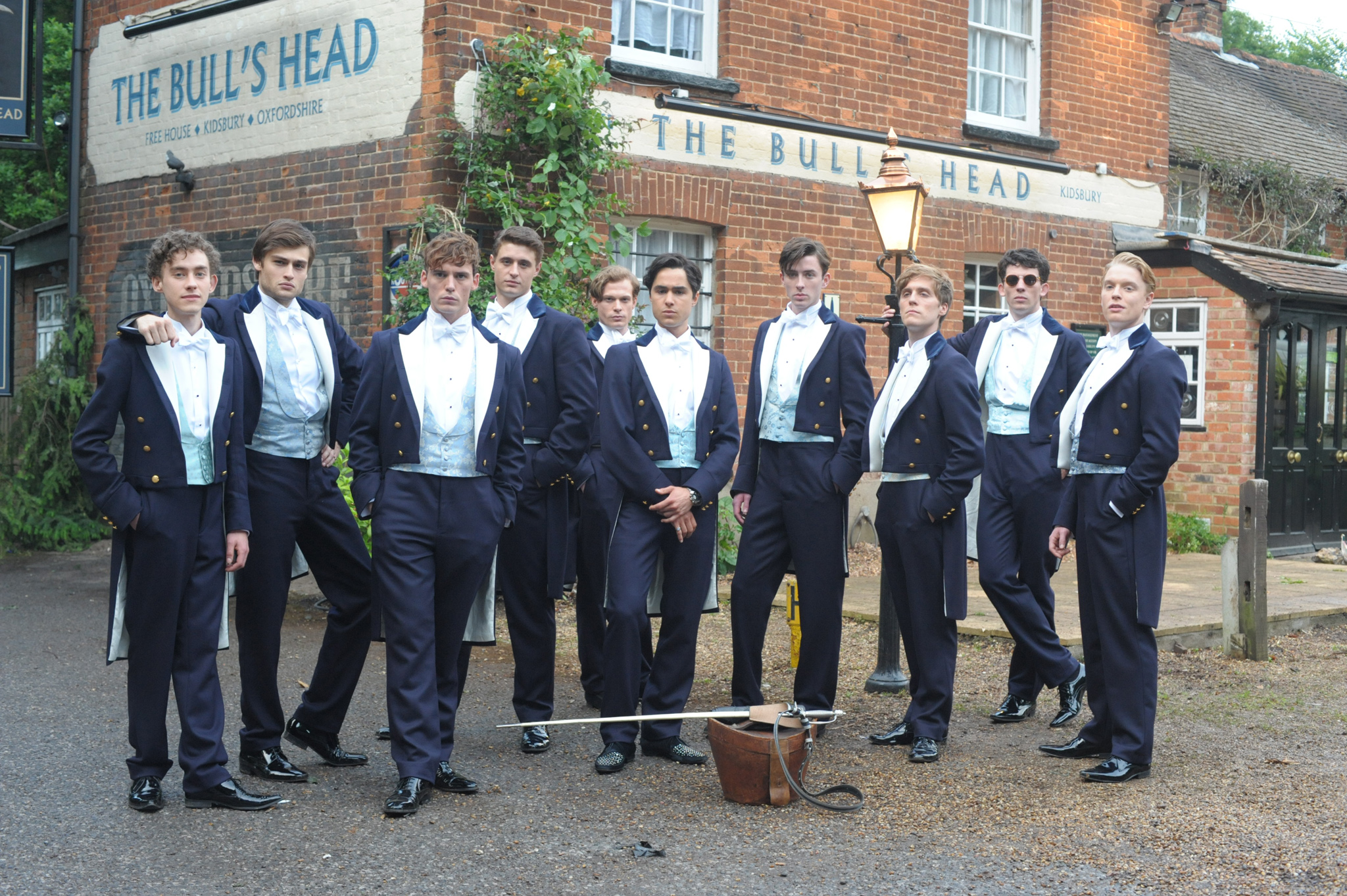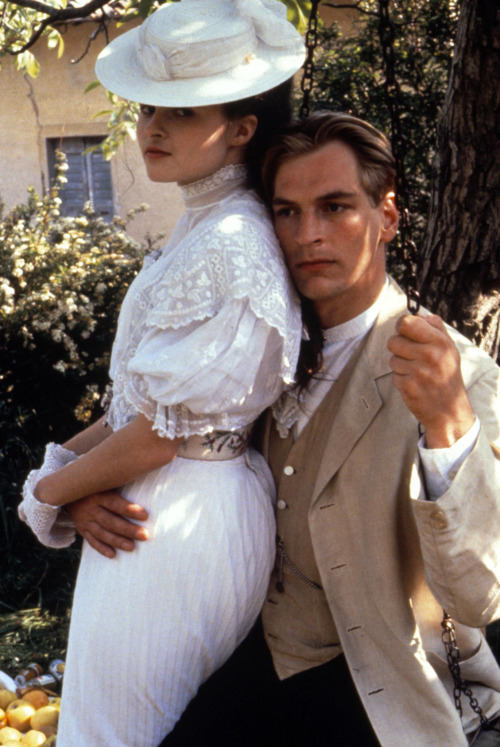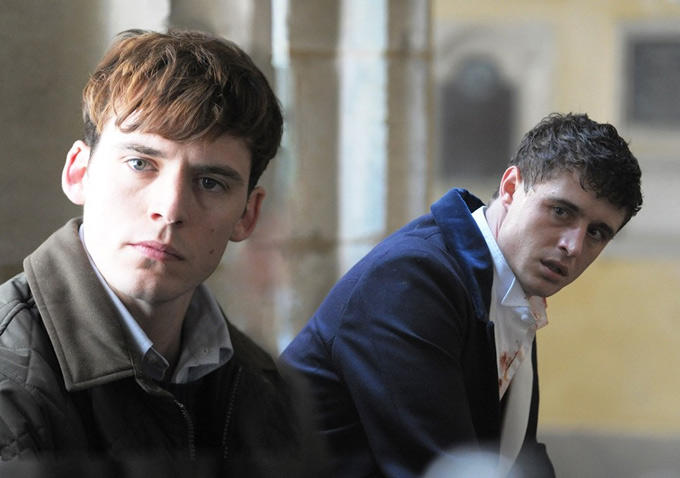David takes a look at the British cultural legacy of poshness as The Riot Club now out on DVD...

Before The Riot Club was a movie, it was a West End play called Posh. Laura Wade’s simple, cutting title gets right to the heart of the social crisis at the centre of her work, which presents a fictionalised version of Oxford’s infamous Bullingdon Club, whose members have included both the current British Prime Minister and Mayor of London. While the traumatic events of the play and film are invented, the social privilege they demonstrate is a British legacy that has lingered throughout history. It continues to be a talking point today, with British soap opera actor Danny Dyer memorably taking pot shots at ‘posh boy’ Benedict Cumberbatch and the social elitism of the British cultural industries. (Dyer’s complaints of elitism are perhaps reflected in some of The Riot Club’s casting – Max Irons (son of Jeremy) and Freddie Fox (son of Edward) both come from British acting dynasties.)
 Britain’s exports and image abroad have been shaped by the likes of Merchant Ivory, Jane Austen and Downton Abbey as one steeped in this kind of privilege and elitism. Occasionally British films of a different kind will have a big enough cultural impact to surface in the timeline of world cinema, with the kitchen-sink dramas of the late 1950s and ‘60s perhaps the most notable instance. But it is the posh boys that have really dominated British cinema’s worldwide reputation, from Leslie Howard (the first cinematic Henry Higgins) through Hugh Grant to the current crop led by Eddie Redmayne and Cumberbatch.
Britain’s exports and image abroad have been shaped by the likes of Merchant Ivory, Jane Austen and Downton Abbey as one steeped in this kind of privilege and elitism. Occasionally British films of a different kind will have a big enough cultural impact to surface in the timeline of world cinema, with the kitchen-sink dramas of the late 1950s and ‘60s perhaps the most notable instance. But it is the posh boys that have really dominated British cinema’s worldwide reputation, from Leslie Howard (the first cinematic Henry Higgins) through Hugh Grant to the current crop led by Eddie Redmayne and Cumberbatch.
But why is this model of Britishness so favoured internationally? [More...]
Part of it could be down to the accent – regionally specific dialects like London’s cockney accent, Newcastle’s Geordie or my own hometown Brummie drone are inherently more difficult to understand for an international audience who required subtitles for the Scottish mire of Trainspotting. The Full Monty overcame this, and Michael Caine got away with it thanks to his dashing charm, but even he slowly saw his accent softened to a unique transatlantic cockney sweetness.
It could also be cinematic conditioning to understand this poshness as equaling Britishness. The more black-and-white narratives of Classic Hollywood frequently included villains played by devilishly camp British actors, and these films didn’t necessarily make a plot point of their nationality. The underlying homosexual threat to the macho American male has its origins in the homosocial environments of British upper class society, specifically the public schooling seen in Lindsay Anderson’s seminal If… and Chariots of Fire, and referred to in The Riot Club. These days, such a connotation is horrendously outdated and offensive, although Lone Scherfig’s adaptation still has a hint of it in the low-key predatory glances of Sam Reid’s character Hugo, who hopelessly lusts after Max Irons’ central ‘hero’.
 Alistair (Sam Claflin) and Miles (Max Irons)
Alistair (Sam Claflin) and Miles (Max Irons)
The underlying violent superiority of the boys in The Riot Club plays on lingering mistrust of society’s intellectual, fiscal and social ‘betters’, with this young and frivolous generation the last bastion of the libertines of the 1800s – a man like Pride and Prejudice’s selfish Wickham, charming and handsome but a liar, cheat, and womanizer. The Riot Club’s opening makes light of the club’s history, as ‘Lord Riot’ (Harry Lloyd) ‘lives and dies by the sword’; it’s the mission of the remainder of the film to implode this rather misguided amusement at such debauchery.
 Harry (Douglas Booth)The critical problem with Scherfig’s film is that it falls prey to the demands of marketable cinema. When Douglas Booth is revealed beneath a fencing helmet, both his opponent’s girlfriend and the camera are visibily taken aback by his beauty. Max Irons’ charming but modest Miles is favoured over Sam Claflin’s foppish, surly Alistair because his perfectly chiseled features make him an aspirational figure. Ben Schetzer’s Dimitri is appalled at the suggestion of underlying prejudice against his Greek heritage – he’s beautiful, as anyone who has seen Pride will remember, but he’s not the handsome, dapper white specimen the club requires at his helm. The nerdier members of the group are treated as the film’s comic buffoons, obnoxiously offering disgusting kidneys to eat and snorting grossly in place of proper laddish laughter.
Harry (Douglas Booth)The critical problem with Scherfig’s film is that it falls prey to the demands of marketable cinema. When Douglas Booth is revealed beneath a fencing helmet, both his opponent’s girlfriend and the camera are visibily taken aback by his beauty. Max Irons’ charming but modest Miles is favoured over Sam Claflin’s foppish, surly Alistair because his perfectly chiseled features make him an aspirational figure. Ben Schetzer’s Dimitri is appalled at the suggestion of underlying prejudice against his Greek heritage – he’s beautiful, as anyone who has seen Pride will remember, but he’s not the handsome, dapper white specimen the club requires at his helm. The nerdier members of the group are treated as the film’s comic buffoons, obnoxiously offering disgusting kidneys to eat and snorting grossly in place of proper laddish laughter.
The film’s climactic acts of violence are provoked by Alistair’s resentment that Miles has taken the place as the club’s favoured new member essentially bequeathed to Alistair by his “top dog” brother, the club’s former leader. Even when Alistair is mugged, his can’t turn off his automatic superior attitude. While the classic camp British villainy might be outdated, Claflin’s muted snarl is hardly a far cry from that simpler mode of characterisation. If Miles begins the outlier American hero, he ends subsumed into the dastardly British cruelty, his heritage overcoming his vague attempts at escaping his privilege. When offered the chance of escape by Lauren’s sudden appearance, Miles’ reflex is to stick with his club, because to abandon such high status on the whim of a girlfriend is simply not done, sire.
 Lauren (Holliday Grainger) and Miles
Lauren (Holliday Grainger) and Miles
As The Guardian suggested on the film’s UK release almost a year ago, The Riot Club
...glamorises the iniquity it purports to condemn. The Riot boys are nasty but beautiful and exuberant; the proles are worthy but lumpen, in both body and spirit.”
The appeal of the club is the complete abandon and the lack of repercussions; though the real Bullingdon club never went this far, the fictional boys’ future as political figures is seemingly inevitable even in the face of the film’s events. Perhaps the world favours this mode of Britishness because it remains the model of impeccable, untouchable cultural refinement – that which the narrative of The Riot Club seeks to undermine, but which it ultimately upholds through casting talented but privileged actors and making their desirability the cruel irony of their characters.